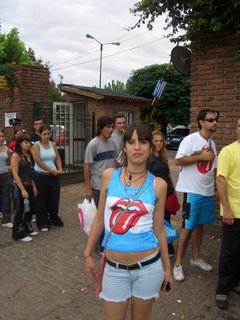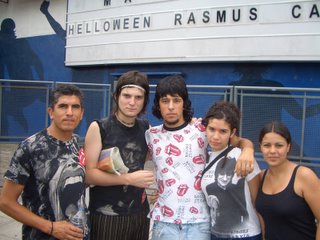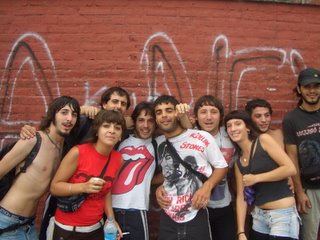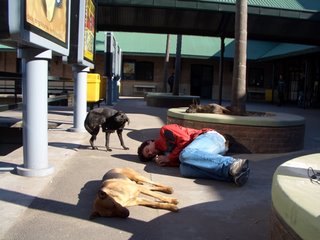El País Estón (The Stone Nation)
 The Rolling Stones are the biggest thing going in Argentina. As I write, the Stones are probably on their way to Estadio Monumental, where tonight they will play the second of two shows, which sold out instantly.
The Rolling Stones are the biggest thing going in Argentina. As I write, the Stones are probably on their way to Estadio Monumental, where tonight they will play the second of two shows, which sold out instantly.For the past two weeks, the front pages of every major newspaper plotted the band’s progress towards Buenos Aires. As their arrival neared, the headlines multiplied and their enthusiasm grew, though there were complaints that Argentina, the most estón country in the world, wouldn’t have a free concert like the one in Rio last weekend.
On Tuesday night, when Mick Jagger introduced his bandmates, the response to Keith Richards’s name was so overwhelming that the haggard guitarist fell to his knees in thanks.

Tickets have been selling on the internet from 300 pesos (about $100), so I knew there was no chance I was going to get inside the stadium. Still I had to see part of the spectacle, so this afternoon I headed down to the stadium to see the 65,000 people who were lucky enough to have gotten tickets.
The line stretched for miles down the Avenida Libertador. Everywhere you looked there were big shaggy haircuts and the tongue logo.
I had questions. I wanted Argentines to explain to me why they are such fanatics of the Stones. And being a student of language, I wanted better definitions of the words rolinga (“rolling”) and estón (“stone”).
I first spoke to Darío Logiudice, 34, from Boedo – a neighborhood more associated with tango. He explained to me that he’d been listening to the Stones since he was a kid. For him, the Stones appearance in Argentina was the realization of something impossible; most people thought they’d never return after the economic collapse of 2001. What’s more, he explained, is that “estamos en el 60,” as in, we’re stuck in the 60s. When asked if he was rolinga, he shook his head emphatically, dismissing it as a fashion. “En la vida soy estón,” he said (roughly, “I live as a Stone”). The tongue tattoo on his left shoulder left no doubt.
 Next I spoke to Germán, a 42 year-old from Quilmes, one of the outlying cities that forms part of Gran Buenos Aires. He was with his daughters and her friends. They too dismissed rolinga as being a fad, a look. When I asked why they liked the Stones so much, they explained that rock has a long history in Argentina – and German’s been listening to the Stones since he was 8. I took their picture and promised to send it to them. Germán didn’t have an email address, but the kids all did: two of them were piedrarodante_18 (rollingstone_18) and vero_larolling.
Next I spoke to Germán, a 42 year-old from Quilmes, one of the outlying cities that forms part of Gran Buenos Aires. He was with his daughters and her friends. They too dismissed rolinga as being a fad, a look. When I asked why they liked the Stones so much, they explained that rock has a long history in Argentina – and German’s been listening to the Stones since he was 8. I took their picture and promised to send it to them. Germán didn’t have an email address, but the kids all did: two of them were piedrarodante_18 (rollingstone_18) and vero_larolling. At last I approached a group of kids who were furtively passing a joint around. Bemused by the presence of the Berlitz-accented Yankee, they gathered for a picture. I then spoke to Ezequiel, a 26 year old from La Plata, a nearby coastal city. Ezequiel identified himself as a citizen of the “madre patria del rocanroll,” a nation that knows no borders. He and his friends dismissed rolinga as a label. “These kids put on a t-shirt, but they know nothing about the music,” one of them said.
At last I approached a group of kids who were furtively passing a joint around. Bemused by the presence of the Berlitz-accented Yankee, they gathered for a picture. I then spoke to Ezequiel, a 26 year old from La Plata, a nearby coastal city. Ezequiel identified himself as a citizen of the “madre patria del rocanroll,” a nation that knows no borders. He and his friends dismissed rolinga as a label. “These kids put on a t-shirt, but they know nothing about the music,” one of them said.



3 Comments:
Awesome dude. Just awesome. I hope I can find as amusing a scene as yours when I travel to Europe this summer.
What can I say? This is a passionate country. And, come on, "Are You Gonna Go My Way?" is a pretty good song. Right? Oh, nevermind...
Yes Yes The Stone Country, I´ve saw them both in the States and in Argentina, and there was a bit difference!!!: in the States the people on the field where sitting in ther chairs!!!!
I´m argentinian of course,
regards
Post a Comment
<< Home